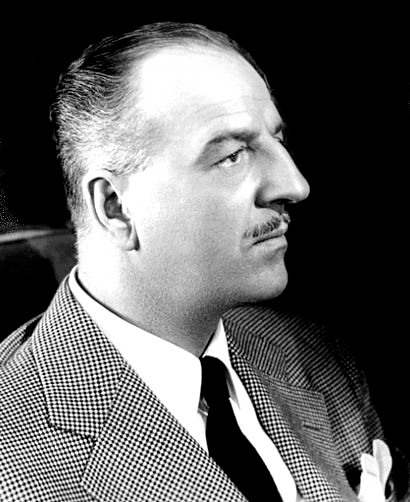Louis Calhern (Carl Henry Vogt)

Louis Calhern was born in Brooklyn, New York. His father was a tobacco dealer. His family left New York while he was still a child and moved to St. Louis, Missouri, where he grew up. While Calhern was playing high school football, a stage manager from a touring theatrical stock company spotted him, and hired him as a bit player. (Another source says, “Grace George hired his St. Louis high school football team as supers for a Shakespearean play.” Just prior to World War I, Calhern decided to move back to New York to pursue an acting career. He began as a prop boy and bit player with touring companies and burlesque companies. He became a matinee idol by virtue of a play titled Cobra Louis Calhern’s Broadway credits include Roger Bloomer (1923), The Song and Dance Man (1923-1924), Cobra (1924), In a Garden (1925-1926), Hedda Gabler (1926), The Woman Disputed (1926-1927), Up the Line (1926), The Dark (1927), Savages Under the Skin (1927), A Distant Drum (1928), Gypsy (1929), The Love Duel (1929), The Rhapsody (1930), The Tyrant (1930), Give Me Yesterday (1931), Brief Moment (1931-1932), The Inside Story (1932), Birthday (1934-1935), Hell Freezes Over (1935-1936), Robin Landing (1937), Summer Night (1939), The Great Big Doorstep (1942), Jacobowsky and the Colonel (1944-1945), The Magnificent Yankee (1946), The Survivors (1948), The Play’s the Thing (1948), King Lear (1950-1951), and The Wooden Dish (1955). Louis Calhern’s burgeoning career was interrupted by the war, and he served overseas in the 143rd Field Artillery of the United States Army during World War I.
Louis Calhern started working in silent films for director Lois Weber in the early 1920s; the most notable being The Blot in 1921. A 1921 newspaper article commented, “The new arrival in stardom is Louis Calhern, who, until Miss Weber engaged him to enact the leading male role in What’s Worth While?, had been playing leads in the Morosco Stock company of Los Angeles.” In 1923 he left film, but would come back eight years later; a little while after movies started talking; primarily cast as a character actor in Hollywood (Ambassador Trentino in the Marx Brothers movie Duck Soup), while he continued to play leading roles on stage. He reached his peak in the 1950s as a Metro-Goldwyn-Mayer contract player. Among his most memorable roles were three that he played in 1950: a singing one as Buffalo Bill in the film version of Annie Get Your Gun, the double-crossing lawyer and sugar-daddy to Marilyn Monroe in John Huston’s The Asphalt Jungle, and his Oscar-nominated role as Oliver Wendell Holmes in The Magnificent Yankee (re-creating his stage role), as well as his portrayal of the title role in Joseph L. Mankiewicz’s film Julius Caesar in 1953 (adapted from Shakespeare’s play). In his film career, he played the grandfather in The Red Pony (1949), adapted from the novel by John Steinbeck and starring Robert Mitchum, and the spy boss of Cary Grant in the Alfred Hitchcock suspense classic Notorious (1946). A performance as “wicked Uncle Willie” in High Society (1956), a musical remake of The Philadelphia Story, turned out to be the actor’s final film.
Louis Calhern died of a sudden heart attack in Nara, Japan, while filming The Teahouse of the August Moon. He was replaced in the film by Paul Ford, who had played Calhern’s role in the original stage version. By an odd coincidence, when playing Buffalo Bill in Annie Get Your Gun, Calhern had replaced Frank Morgan, who had died of a sudden heart attack during the making of that film. Calhern is interred at Hollywood Forever Cemetery.
Born
- February, 19, 1895
- USA
- Brooklyn, New York
Died
- May, 12, 1956
- Tokyo, Japan
Cause of Death
- heart attack
Cemetery
- Hollywood Forever Cemetery
- Hollywood, California
- USA



